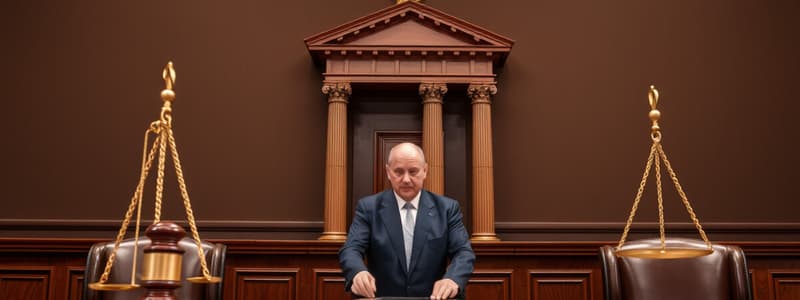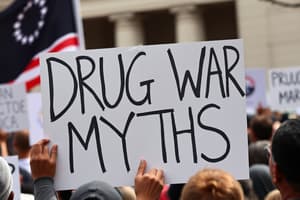Podcast
Questions and Answers
What is the primary responsibility of the federal government in the criminal justice system?
What is the primary responsibility of the federal government in the criminal justice system?
- Operating jails and correctional facilities
- Managing all criminal justice functions on a national level (correct)
- Creating state laws
- Handling law enforcement
Which level of government is typically responsible for creating criminal laws?
Which level of government is typically responsible for creating criminal laws?
- International government
- State government (correct)
- Federal government
- Local government
What do legislatures create that define what actions are crimes?
What do legislatures create that define what actions are crimes?
- Policies
- Statutes (correct)
- Regulations
- Guidelines
Which of the following best describes the function of the judiciary in the criminal justice system?
Which of the following best describes the function of the judiciary in the criminal justice system?
What is the role of the legislature in relation to financing criminal justice activities?
What is the role of the legislature in relation to financing criminal justice activities?
What is a common misconception about trial courts in the context of criminal justice?
What is a common misconception about trial courts in the context of criminal justice?
How does dual federalism impact the creation of criminal laws in the United States?
How does dual federalism impact the creation of criminal laws in the United States?
What is the primary function of appellate courts in the criminal justice system?
What is the primary function of appellate courts in the criminal justice system?
What does judicial review allow appellate courts to do?
What does judicial review allow appellate courts to do?
Which of the following statements accurately describes the United States Supreme Court?
Which of the following statements accurately describes the United States Supreme Court?
How does the dual court system operate in the United States?
How does the dual court system operate in the United States?
What role does the executive branch play in shaping the criminal justice system?
What role does the executive branch play in shaping the criminal justice system?
Which of the following options best defines discretion in the context of the criminal justice system?
Which of the following options best defines discretion in the context of the criminal justice system?
What is meant by the goal of efficiency in the criminal justice system?
What is meant by the goal of efficiency in the criminal justice system?
What can happen if an appellate court finds a law unconstitutional?
What can happen if an appellate court finds a law unconstitutional?
What is the effect of decisions made by the Supreme Court on law enforcement activities?
What is the effect of decisions made by the Supreme Court on law enforcement activities?
What does effectiveness in the criminal justice system primarily aim to achieve?
What does effectiveness in the criminal justice system primarily aim to achieve?
Which concept is crucial for guaranteeing fair treatment under the law within the criminal justice system?
Which concept is crucial for guaranteeing fair treatment under the law within the criminal justice system?
What is one of the main challenges faced by the criminal justice system in the United States?
What is one of the main challenges faced by the criminal justice system in the United States?
What does the Nonsystem Argument suggest about the criminal justice system?
What does the Nonsystem Argument suggest about the criminal justice system?
Which constitutional component primarily protects individual rights within the criminal justice system?
Which constitutional component primarily protects individual rights within the criminal justice system?
How do the federal and state criminal justice systems primarily differ?
How do the federal and state criminal justice systems primarily differ?
What is a fundamental goal of fairness in the criminal justice system?
What is a fundamental goal of fairness in the criminal justice system?
What role do local police departments typically serve in the United States?
What role do local police departments typically serve in the United States?
Which of the following best describes the significance of the Constitution in the criminal justice system?
Which of the following best describes the significance of the Constitution in the criminal justice system?
Flashcards are hidden until you start studying
Study Notes
Overview of the Criminal Justice System
- The criminal justice system operates under the three branches of government: legislative, judicial, and executive.
- Each branch has distinct responsibilities but collaborates across federal, state, and local levels.
Roles of Government Levels
- Federal Government: Oversees national criminal justice functions, including national law enforcement and federal law enforcement agencies.
- State Governments: Responsible for creating criminal laws and managing state correctional facilities.
- Local Governments: Primarily handle law enforcement and jail operations.
Role of the Legislature
- Legislatures create laws, defining crimes and corresponding punishments through statutes and codes.
- Most criminal laws in the U.S. come from state legislatures, reflecting the dual federalist system in governance.
- Legislatures provide essential financial support for criminal justice agencies, ensuring ongoing operations.
Role of the Judiciary
- The judiciary consists of trial courts (which determine guilt and impose sentences) and appellate courts (which review cases for potential errors).
- Plea bargaining is common, with most defendants opting to plead guilty rather than going to trial.
- Judicial review allows appellate courts to assess the constitutionality of laws enacted by legislatures.
Role of the Executive
- The executive branch enforces laws, with leaders like the President and governors appointing key criminal justice officials.
- Public officials set criminal justice agendas and respond to public needs while managing interests of victims and defendants.
- Discretion in law enforcement and judicial roles can significantly impact the criminal justice system's operation.
Common Objectives of the Criminal Justice System
- Efficiency: Utilizing resources effectively to achieve public safety and operational objectives.
- Effectiveness: Ensuring equity and proportionality in enforcing laws and protecting constitutional rights.
- Fairness: Providing due process, ensuring equal treatment under the law, and maintaining individual rights throughout the justice process.
Constitutional Framework
- The U.S. operates two separate criminal justice systems: federal and state, with differing processes and practices.
- Most law enforcement occurs locally, leading to state-level handling of the majority of criminal cases.
- The federal system intervenes primarily in cases involving federal laws or constitutional issues.
Nonsystem Argument
- Critics argue that the criminal justice system is fragmented and lacks a cohesive structure, operating independently across various agencies.
- This lack of coordination leads to debates about the effectiveness and efficiency of the criminal justice framework.
Rules and Regulations
- The criminal justice system operates under a hierarchy of laws, beginning with the U.S. Constitution and its amendments.
- Federal and state statutes govern criminal procedures, with specific agency regulations outlining operational protocols for criminal justice agents.
Discretion in the Criminal Justice System
- Discretion allows professionals within the system to make decisions based on the specifics of each case, promoting adaptability.
- Conversely, misuse of discretion can lead to biased practices, affecting fairness and equality in treatment of different individuals.
Juvenile Justice Developments
- Historically, children were treated as adults under common law; significant changes emerged in the 19th century recognizing developmental differences between children and adults.
- The Juvenile Court Movement, beginning in 1899, emphasized rehabilitation over punishment for youth offenders, reflecting societal shifts in recognizing children’s need for guidance and treatment.
Studying That Suits You
Use AI to generate personalized quizzes and flashcards to suit your learning preferences.




